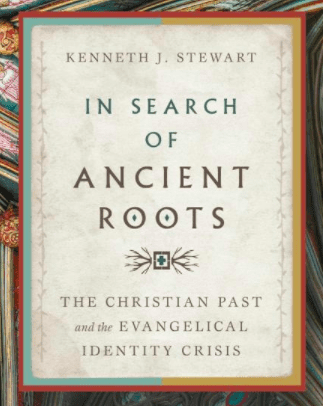One of the implications of the way many of us — I include myself — talk about evangelicalism suggests or claims that it is largely an 18th or 19th Century movement, something connected to the Great Awakening. Yes, to be sure, its theological roots are in the Reformers but its particular emphases are more recent. What are those emphases? The cross, the Bible, personal conversion, and active Christian living. This is often called the Bebbington Quadrilateral (see this book of his).
Kenneth Stewart’s new book contends that the implication of Bebbington’s work — it is recent rather than ancient — deserves to be challenged. Stewart’s book, In Search of Ancient Roots: The Christian Past and the Evangelical Identity Crisis, makes a case that evangelicalism’s distinctives have emerged and bubbled over throughout the entire history of the church.
In Search of Ancient Roots: The Christian Past and the Evangelical Identity Crisis, makes a case that evangelicalism’s distinctives have emerged and bubbled over throughout the entire history of the church.
Stewart offers these arguments, and I’m not sure how they can possibly be countered:
First, R.A. Knox’s famous Enthusiasm argument. The argument Stewart makes is this: Knox’s aversion to ultra-supernaturalism groups — Montanists, Donatists, Waldensians, French Jansenists, George Fox, the radical French Huegenots, John Wesley and the Wesleyans — by not liking their intense religion and expectation that this is the norm for all Christians demonstrates a kind of continuity in personal experience throughout the history of the church. Here are the common themes:
Knox claimed always to find a readiness to expect divine communications or impressions extending beyond conventional revelation; a high expectation that Gods dealings with humans are of a kind that will be sensed, felt, and observed (including some of a disorderly kind); and a tendency to a somewhat preening self-consciousness (of an individual’s sense of special importance in God’s purposes) (26).
Second, what is true about Luther was true of others before him — of people like John Wycliffe and John Hus, and Stewart mentions others — many of whom were at work in the century or two prior to Luther. In other words, courageous stalwarts defending the themes characteristic of the evangelicals and of Luther. Thus, Stewart is building a case for evangelicalism’s themes being a “hardy perennial.”
Third, and what I think is most powerful for his case, there have been a number of scholars whose work have focused on continuity between evangelical themes and the whole history of the church.
He goes to John Jewel, who constructed an apology for historic Christianity in the 16th Century. He challenged the Roman Catholic doctrines of transubstantiation, multiple masses for the dead, Latin, withholding the Bible from common people, images and esp the see of Rome.
He then proceeds to Philip Schaff, who is well-known for his editions of the fathers as well as his multi volume work on church history, a set standard when I was a young student. Schaff’s argument was that evangelical Protestantism is a “fuller expression power and genius latent in the Christian gospel from the time of its origin” (35).
His last example is GR Evans, who argued that the very features characteristic in evangelicalism and of the Reformers were concerns of other Catholic theologians prior to Luther. Thus,
the grievances aired against the late medieval church by both the advocates of reform within Catholicism and those who aligned themselves with the nascent Protestant movement were one and the same as those earlier raised at intervals over the preceding millennium (36).
Which issues? the role of the papacy, general access to the Bible, and understandings of the Lord’s Supper. Hence,
A very high proportion of the doctrinal convictions enunciated by the Reformers of the sixteenth century had indeed been articulated long before, and repeatedly, by earlier advocates of biblically rooted theology. It seems that recognizing this continuity and recurrence of these convictions is the best way for us to see that the evangelical emphasis on Scripture, personal faith in Christ, and the importance of the pursuit of godliness was really a continuation of emphases that had always had advocates in the millennium following the death of the last apostle. And when we have granted this fact—that the Christian mainstream was often deficient and frequently mistaken in what it insisted on as non-negotiable, and in consequence provoked dissent and controversy that was generally suppressed—we have come to stare this conclusion in the face: the evangelical tendency has always been active within the church Jesus founded (39-40).











